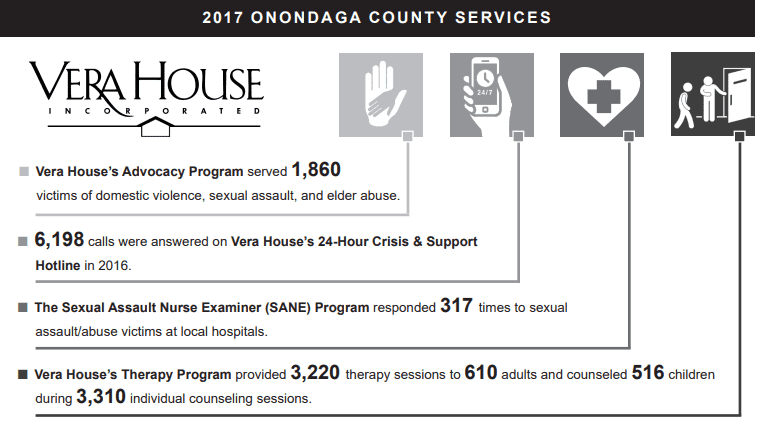Vera House explains how Kavanaugh’s nomination is triggering for survivors
Vera House explains how Kavanaugh’s nomination is triggering for survivors
The battle for ending sexual and domestic violence is like the Hasbro Chutes and Ladders® game, says Randi Bregman, Executive Director of Vera House. It’s a game she’s hated since childhood.
“You work your way on a path, you’re almost there, you can see the end, and you slide back,” Bregman says. “And when you slide back you feel like, ’Can I ever get where I’m heading?’ But if you stay in the game, you do. Because even though they send you back, you get there eventually.”
Vera House, a domestic and sexual violence service agency, held its 29th annual Report to the Community on domestic and sexual violence in Syracuse’s City Hall Commons Atrium on October 4. Local leaders came together to discuss the progress made in providing community coordination and prevention programming.
Helen Hudson, the Syracuse Common Council President, and Sheriff Eugene Conway officially proclaimed October as Domestic Violence Awareness Month in the City of Syracuse and Onondaga County.
For the first time in Onondaga County history, a purple and teal flag was raised in front of City Hall in honor of survivors. Purple is the national color for domestic violence awareness and teal is the national color for sexual assault. The flag flies both colors to show how these issues are intertwined.
Survivor Julie Lovenberg says it’s nice to feel supported and listened to on a local level about this issue when the greater political climate has made her feel unacknowledged.

Brett Kavanaugh’s recent court nomination became such a polarizing topic that at the same time as the Report to the Community was occurring, just over a mile away, students and staff at Syracuse University were protesting the nomination. The protestors’ goal was to show solidarity and support for women, such as Dr. Christine Blasey Ford, Deborah Ramirez and Julie Swetnick, who called for Kavanaugh to be denied a seat on the Supreme Court due to accusations of sexual assault.
Brenberg delivered some advice she’s learned from her 28 years at Vera House for people to consider amidst these tensions:
Believe survivors. They have more to lose than gain in coming forward.
Understand that traumatic memories are never forgotten and often re-lived. Neuroscience shows that survivors often forget details surrounding the actual traumatic event.
People who commit domestic and sexual violence generally only target certain victims, not everyone. The perpetrators can be likable to the public and still make harmful assaults behind closed doors.
Survivors at the protest carried posters highlighting reasons they were hesitant to initially speak up about their own experiences with sexual assault. Reasons included blaming themselves for the attacks or, quite simply, never being asked about them.
Vera House has offered a comprehensive plan for ways to improve the problems of sexual and domestic violence, as well as elder abuse in the greater Syracuse area. For more information on their progress click here.





